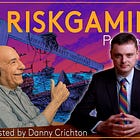Reactions from Hill & Valley, the case for reading obituaries, top up-and-coming startups, and a quarter-billion-dollar crypto theft. Plus remembering Daniel Kahneman on risk.
From Lux Capital
In a new piece, Lux Capital’s Brett McGurk and Josh Wolfe make the case for greater cooperation between Silicon Valley and Washington. Ahead of this year’s Hill & Valley Forum, the two authors set out an agenda for sci-tech diplomacy based on three strategic questions: How can we best harness innovation for national defense; should we build walls or grow advanced tech partnerships; and how do we win the talent war, attracting global minds and developing our own?
For a briefing on Josh’s remarks at the forum, check out Mohar Chatterjee’s reporting in Politico, along with this clip from the conference sidelines, in which he lays out his reasons for believing a bubble in airspace and defense is coming.
Josh’s interview on shrinking the gap between science fiction and science fact with Mario Gabriele of The Generalist podcast is also worth a listen (or watch).
In a new blog post, meanwhile, Grace Isford updates her map of up-and-coming AI startups in New York City you should know about.
From Around the Web
1. Speedy science
I enjoyed Stephen Malina’s call for biologists to work more like computer programmers in Asimov Press.
I’ve become increasingly convinced that biologists have an almost masochistic tolerance for difficult and protracted work. While I deeply respect that tolerance, it can keep the field stuck: if we see pain as par for the course, it’s easy to overlook chances to make biological research faster, cheaper, and more efficient. What we need instead, then, are systems and tools that accelerate the experiments, assays, and basic methods. In fact, speeding up feedback loops in biology should be a national priority.
2. Deathwatch
Want to unleash your creativity? Read obituaries, writes Keith Sawyer in The MIT Press Reader. H/t our scientist-in-residence Sam Arbesman.
One popular piece of advice for boosting creativity is to learn something new every day. But here’s the catch: This only works if that new information is very different from what’s already in your head. This is where most of our modern habits fall short. Internet searches, for instance, give you information that’s related to what you already know, or information that you’re already interested in. So, how do you escape that loop and stumble upon something unexpected, something you didn’t even know to look for? The obituaries, obviously.
3. Speaking of obits
Laurence Pevsner recommends Matt Ribel’s look at a team from George Mason University running a “body farm” to improve our understanding of human decomposition and further the field of forensics.
The science of death investigation is nascent. It’s nothing like prime-time television. In the universe of CSI: Crime Scene Investigation, the future has always been now. Fictional detectives can pull partial fingerprints from a rusty chain-link fence and synthesize the fragments into a pristine composite. They can pour plaster into a stab wound, wait for it to solidify, and identify the exact knife used by the freak of the week. DNA is everywhere, and—great news—the lab can have a full genetic readout by lunch, instead of ten to 15 business days from now.
But TV death investigations are high-tech hooey. In reality, even the most fundamental questions are difficult to answer, including When did this person die?
4. Chicken jerk-y
From a Riskgaming reader: Don’t miss Mitch Moxley’s reporting on the wild tale of the kids who stole a quarter-billion worth of crypto.
A group of young men, some of whom connected on a Minecraft server, were suspected of taking a quarter of a billion dollars from an unwitting victim, setting off an incredible chain of events that involved an online network of cybercriminals, some of them teenagers; a group of independent digital detectives who track their efforts; and several law-enforcement agencies. Now, it seemed, the whole thing had culminated in the kidnapping of the Chetals — a real-world spillover from the brazen lawlessness of this expanding digital underworld and the culture that surrounds it.






